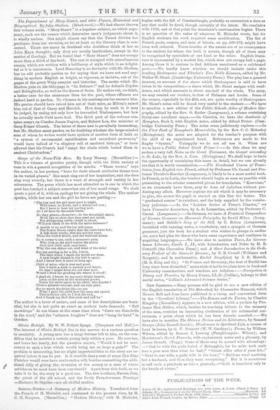Songs of the Noon-Tide Rest. By Lucy Massey. (Macmillan.)— This
is a volume of genuine poetry, though with too little variety of tone to win a general recognition of its merits. "Those verses," says the author, in her preface, "have for their almost exclusive theme love in its varied phases." She must sing out of her inspiration, and she does sing very sweetly, but there is a want of strength and variety in her utterances. The poem which has most attracted us is one in which the poet has touched a subject somewhat out of her usual range. We shall quote a part of it, with an apology for not giving the whole. The mother speaks, while her son and the girl he loves are parting :—
" The boy and the girl must part to-night,
With tears, no doubt, and a whispered vow; But I have to bear my parting now, As I sit here by the ashes white.
Do they grieve—thosetwo—in the moonlight sheen, With lips so close that they need not speak, Yet whispering softly, cheek to cheek, 'Will you think of me with the miles between?'
A month or so, and the joy will come, The flower bloom sweet that the tears have fed ; A few short weeks, that are quickly sped, Then the ended watch, and the welcome home.
So it seems to me, such a moment's pain, Who look at the grief across the years, Cost how little such easy tears, Why the aim shines out, and what of the rain!
But my parting is for a life. I trow,
The days when I made his world are done, A new bright thread in the web is spun; And I knew how it must be long ago.
Child of mine, who is true and good, Can I think a wish to narrow your heart ; Or that I might keep the old dear part, Would 1 bind the growing life where it stood !
I shall sit, I know, by my son:s bright hearth, Lean on his arm as the weakness grows. Learn his smile again in his child, who knows ? There's pleasure enough, aud an may path.
Bat to watch his fullerlife—to see What I gave the child how the man can spend, That is better still, so I find the end, And I thank my God that such end cal be."
The author is a lover of nature, and some of her descriptions are beau- tiful, but she is not quite as exact as modern taste demands. "Tall snowdrops" do not bloom at the same time when "there are blue-bells in the wood," and the "crimson foxglove" does not "hang its head" in October.


































 Previous page
Previous page